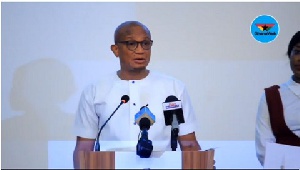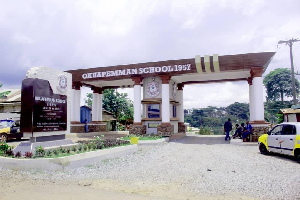- Home - News
- TWI News | TV
- Polls
- Year In Review
- News Archive
- Crime & Punishment
- Politics
- Regional
- Editorial
- Health
- Ghanaians Abroad
- Tabloid
- Africa
- Religion
- Election 2020
- Coronavirus
- News Videos | TV
- Photo Archives
- News Headlines
- Press Release
Business News of Tuesday, 4 December 2018
Source: thebftonline.com
US$100m approved for development of secondary cities
Parliament has approved a US$100million facility to finance the second phase of the proposed Ghana Secondary Cities Support Programme.
The programme is targetted at institutional and infrastructural development in the country’s emerging or secondary cities – aimed at addressing some of the important development challenges while at the same time assisting in implementing government’s decentralisation and urban development policies.
According to a report by the Finance Committee on the financing agreement between government and the International Development Association (IDA), the beneficiary secondary cities under various municipal assemblies being covered under the second phase are Suame, Asokwa,Old Tafo and Obuasi in the Ashanti Region; Berekum in the Berekum East municipality, Sunyani in the Sunyani municipality, Techiman in the Techiman municipality and Dormaa Ahenkro in the Dormaa Central municipality, all in the Brong Ahafo Region.
Others are: Agona Swedru in the Agona West municipality, Kasoa in the Awutu-Senya-East municipality and Saltpond in the Mfantseman municipality, all in the Central Region; Koforidua in the New Juaben South municipality, Akim Oda in the Birim Central municipality, Akim Kibi in the East Akim municipality and Odumase-Krobo in the Lower Manya Krobo Municipality, all in the Eastern Region.
The rest are Effia Kwesimintsim in the Effia Kwesimintsim municipality and Sefwi-Wiawso in the Sefwi Wiawso Municipality in the Western Region; Sagnarigu in the Sagnarigu Municipality, Naleriegu-Gambaga in the East Mamprusi Municipality and Salaga in the East Gonja Municipality, all in the Northern region; Bawku in Bawku municipality and Bolgatanga in Bolgatanga municipality in the Upper East Region; Ho in Ho Municipality and Hohoe in Hohoe Municipality in the Volta Region; and Wa in Wa Municipality in the Upper West Region
The development of these secondary cities will enable them to play their key roles as administrative centres; as incubators for small business development, and as nodal points in rural-urban linkages.
The municipal capitals of the beneficiary municipalities were selected based on the population size of between 100,000 and 250,000 and assemblies with at least 60% of the population being urban.
The New Patriotic Party (NPP) Member of Parliament for New Juaben North and a Deputy Minister of Local Government and Rural Development, Kwasi Boateng Adjei, and National Democratic Congress (NDC) Member of Parliament for Banda, Ahmed Ibrahim – who is also the First Deputy Minority Chief whip, fully supported government’s intention to upgrade these secondary cities.
Mr. Boateng Adjei said the programme is immensely important for improving local government outcomes in the country through the provision of quality urban infrastructure and enhancing institutional capacity for urban management.
The Deputy Minority Chief Whip said the three major cities, Accra, Kumasi and Takoradi, are choked with people because of rural-urban migration – so, if some of these secondary cities are also developed to the standard of primary cities, people from those municipalities or regions will not rush to Accra for non-existent jobs.
He said that now government is creating six more regions, the regional capitals of those new regions must also receive similar attention for accelerated growth to help stem the tide of rural-urban migration.











